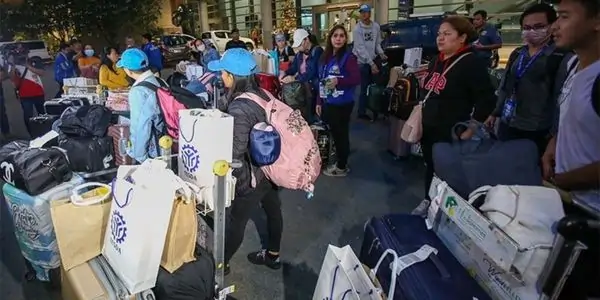As conflict escalates in the Middle East, more Filipinos in Israel are now seeking repatriation. Here’s the latest update on their situation and the Philippine government’s response.

More Filipinos in Israel Seeking Repatriation Amid Escalating Conflict
Growing Number of Filipinos in Israel Request Assistance to Return Home
Amid the ongoing tensions in the Middle East, a rising number of Filipinos in Israel seeking repatriation, citing safety concerns and increasing instability in the region. As of the latest report, 223 Filipinos in Israel and 8 more in Iran have formally requested help to return to the Philippines. This marks a significant development in the government’s continuing efforts to protect Overseas Filipino Workers (OFWs) amid the conflict.

The Situation on the Ground: Displacement and Risk
The Philippine Embassy in Tel Aviv confirmed that the number of Filipinos in Israel seeking repatriation has increased in the past few days. Ambassador Aileen Mendiola reported that more OFWs have expressed fear over their safety, especially following missile attacks and air raid alerts in several Israeli cities. According to embassy data, over 100 Filipinos have lost their homes in the latest wave of violence. At least one Filipino has also been critically injured.
“Marami na pong gustong umuwi, lalo na ‘yung mga nasalanta ng missile strikes,” said Ambassador Mendiola. The embassy is now processing repatriation documents and coordinating with Israeli authorities to assist affected Filipinos.
Repatriation Efforts Underway
On Sunday, the Philippine government successfully flew home 26 Filipinos from Israel, the first batch under the latest repatriation program. These returnees, mostly caregivers and domestic workers, were welcomed at Ninoy Aquino International Airport with temporary shelter and aid prepared by the Department of Migrant Workers (DMW).
Labor officials stated that more batches are expected in the coming days. The embassy is working around the clock to finalize travel documents and flight arrangements for the growing number of Filipinos in Israel seeking repatriation.
Government Response: No Mandatory Repatriation Yet
Despite the spike in repatriation requests, the Department of Foreign Affairs (DFA) and the DMW have reiterated that there is no mandatory repatriation order at this time. Officials emphasize that the current effort is voluntary repatriation, meaning OFWs are free to decide whether or not they want to return.
“We’re respecting their decision. Many OFWs still want to stay despite the risks due to financial reasons or contractual obligations,” said DMW Undersecretary Patricia Ylagan. “But for those who are in danger zones or already displaced, the government is ready to bring them home.”
Financial and Emotional Struggles of OFWs
For many OFWs, the choice to leave Israel is not easy. Some fear losing their jobs permanently, while others worry about debts they have yet to pay off. Despite the danger, some Filipinos in Israel prefer to stay, choosing livelihood over safety. However, others—particularly those who have been directly affected by missile strikes—say they have no choice but to return.
One caregiver, who asked not to be named, said, “Nawasak ang bahay ng amo ko. Hindi na kami safe doon. Kaya kahit mawalan ako ng trabaho, gusto ko nang umuwi.”
Continuous Monitoring and Updates
The Philippine government has assured the public that it continues to monitor the situation in Israel closely. Embassies and consulates are on high alert, and contingency plans are being updated regularly. Hotline numbers have also been activated for OFWs needing help.
Filipino communities are encouraged to stay in contact with embassy representatives and report any emergency situations immediately. The government has also called on Israeli employers to extend understanding and flexibility to their Filipino workers who choose to leave.
Call to Action for Families in the Philippines
For families in the Philippines with loved ones in Israel, the DMW has urged patience and cooperation. Repatriation is being handled in phases, and not all requests can be processed immediately. However, the agency assured that Filipinos in Israel seeking repatriation will receive the support they need, including temporary housing, financial assistance, and help finding alternative work opportunities upon return.
Conclusion
As the conflict continues to disrupt daily life in Israel, the number of Filipinos in Israel seeking repatriation is expected to grow. The Philippine government is responding with active support, but challenges remain, especially for those who must choose between job security and personal safety. What’s clear is that the country stands behind every OFW who decides it’s time to come home.
Follow us for more!
